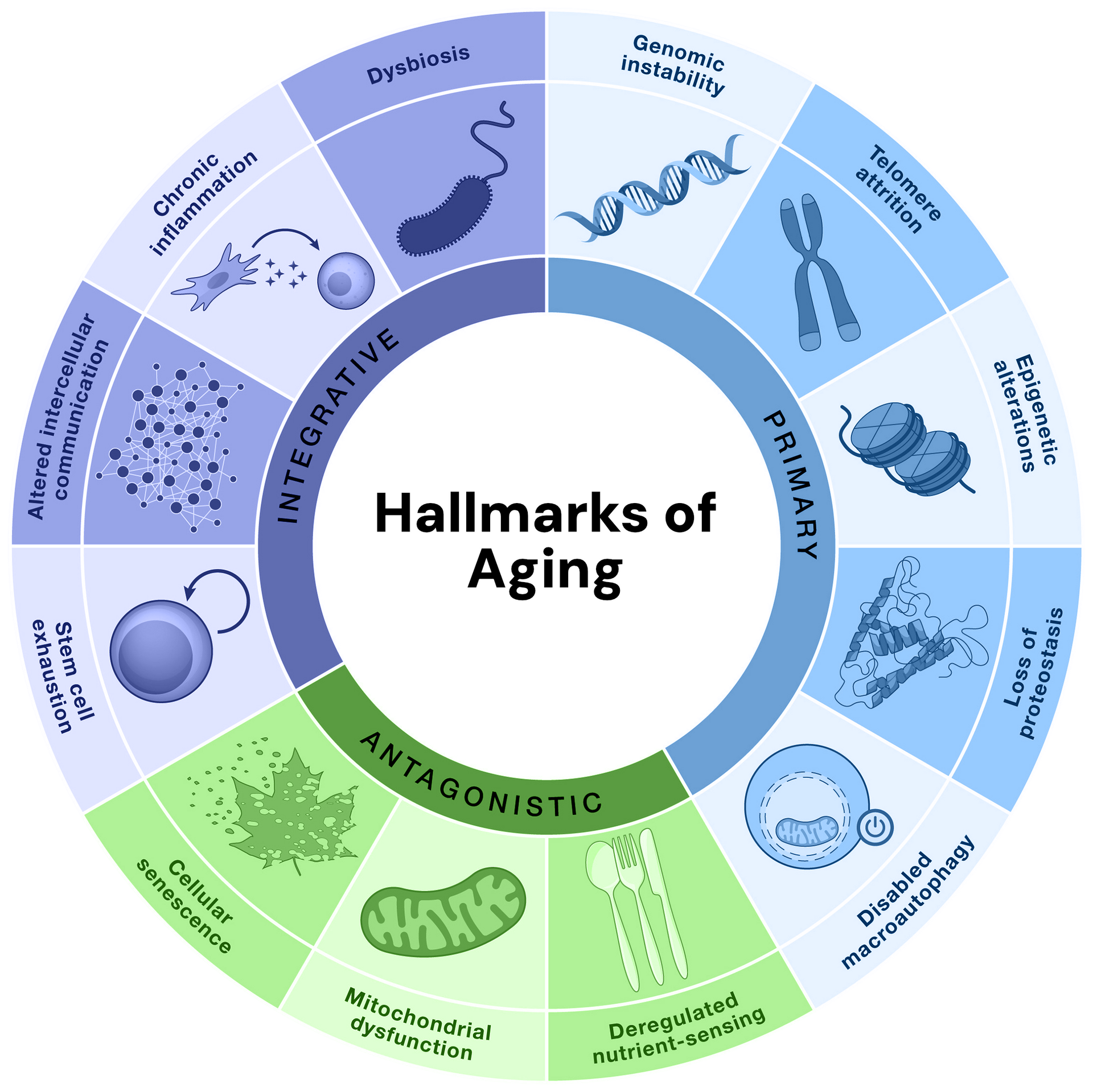Science
Deep dive with us into NAD+
Spotlight on NAD+
We pride ourselves on the scientific foundation behind our products. We understand the importance of evidence-based research and the role it plays in developing effective anti-aging and wellness solutions.
In recent years, interest in NAD+ has significantly increased in many different fields of biomedical research. Groundbreaking studies have revealed the importance of NAD+ in helping to address the hallmarks of aging and age-related decline.
In 1906, British biochemists Arthur Harden and William John Young discovered NAD+ during their studies on fermentation. This vitamin B3 metabolite would later become the focus of cutting-edge 21st-century research. Initially used orally and intramuscularly, NAD+ first underwent clinical trials for intravenous administration in the 1960s.
A key milestone in NAD’s journey was Dr. Birkmeyer’s pioneering work on the L-dopa protocol for Parkinson's patients. His son, George Birkmeyer, later discovered that NAD+ significantly improved clinical responses in a range of neurological conditions.
The many biological functions of NAD+ were continually uncovered over the decades. Researchers now understand that NAD+ isn't just any old molecule; it's a key orchestrator in human health and lifespan.
Evolution of Understanding
Combatting the Hallmarks of Aging
Fast forward to the present, scientists now understand that maintaining robust NAD+ levels is vital for our health and preventing age-related decline. As a vital cofactor in all cellular processes, NAD+ is required for our cells to function efficiently. NAD+ levels profoundly impact human health, particularly as we age.

NAD+ is critical for:
Mitochondrial Biogenesis
Neuroprotection
Cardiovascular Protection
Oxidative Stress
DNA Damage Repair
Stem Cell Rejuvenation
Inflammation
Muscle Function
NAD+ and Cellular Health
NAD+ is essential for regulating cellular metabolism and energy homeostasis. It is required for maintaining DNA integrity, promoting DNA repair, and regulating gene expression. Natural NAD+ production in the body declines with age. As a result, cellular NAD+ reserves become depleted, contributing to metabolic dysfunction and age-related degeneration.
NAD+ and the Aging Process
Research has shown that boosting NAD+ levels affects biological aging by activating sirtuins (often called superhero genes). When activated, sirtuins are associated with the delay of age-related disease and increased longevity. Sirtuins are a class of NAD+ dependent proteins that influence:
Epigenetic expression
Telomere length
Inflammatory response
Stress response
Cellular senescence
Circadian biology
NAD+ is a vital coenzyme required for the transfer of electrons during cellular respiration - a process that converts nutrients into ATP (cellular energy) in your mitochondria - the little powerhouses of your cells.
NAD+ operates as a rate-limiting factor in the electron transport chain, which is a key step in ATP synthesis. If there is insufficient NAD+ available, cellular energy production is inhibited, resulting in energy deficiency and a cascade of negative health effects.
NAD+ and Mitochondrial Function

Dr. David Sinclair and the Fountain of Youth
Dr. David Sinclair, a professor at Harvard Medical School, has been a trailblazer in the exploration of NAD+ and its impact on aging. His journey began with groundbreaking studies that uncovered the pivotal role of NAD+ in regulating cellular aging processes.
Sinclair's research has unveiled a stark reality: as we age NAD+ levels plummet across diverse tissues. This decline is not an insignificant result of aging, but rather a driving force behind various age-related diseases and degenerative disorders. Central to Sinclair's findings is the interaction between NAD+ and a specific group of genes called sirtuins. Sirtuins, often referred to as superhero genes, are known to promote health and longevity.
Using advanced genetic sequencing, Sinclair has proven that NAD+ supplementation activates sirtuins. Hence the name “The Fountain of Youth Molecule”. This breakthrough research is the foundation that has provided scientists and doctors the confidence to prescribe pharmaceutical grade NAD+ as an anti-aging treatment.
Clinical Research
Research on NAD+ therapy is an emerging field of research. Based on available clinical data, interventions to boost NAD+ levels may provide benefits for:
Anti-Aging
Neurological Disorders (Alzheimer’s & Parkinson’s)
Cardiac & Vascular Disorders
Metabolic Diseases (Diabetes & Obesity)
Immune Conditions (Viral Infections & Immune Failure)
Chronic Stress
Cognitive Impairment
Autoimmune Disease
Clinical Depression
Chronic Fatigue Syndrome
Addiction
However, further clinical trials are still needed to confirm therapeutic benefits for all potential indications. While early studies demonstrate safety, more research is needed to fully understand the long-term effects and optimal strategies for NAD+ supplementation in humans.
Research Papers on NAD+
If you wish to dive deeper into the available research on NAD+, we have compiled a selection of key studies, which have provided the basis for the information summarized on the website.

